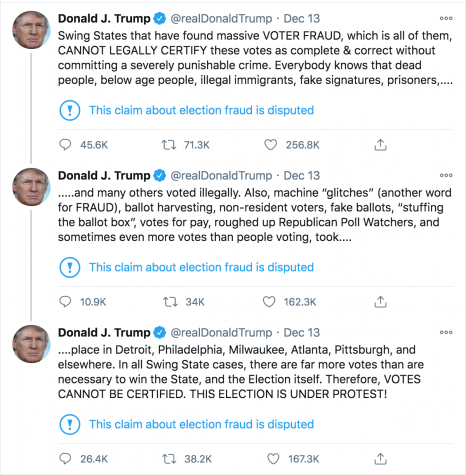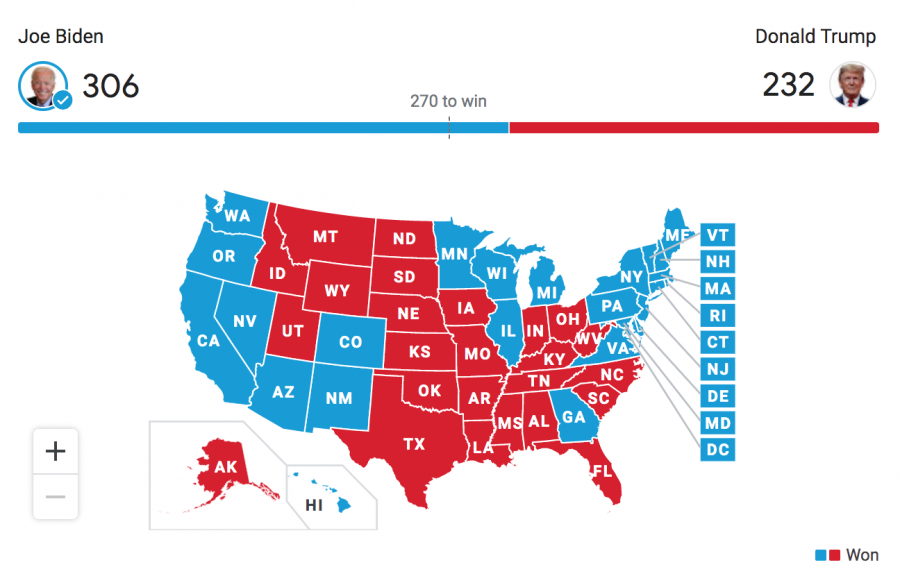Election Recounts
The 2020 election took a great deal longer to decide than past presidential elections. Normally, the results are at least assumed by the end of election day. This year, however, is different in more ways than one. The election was not called by most sources until several days after election day, and was called in favor of former Vice-President and current President-elect Joe Biden. This election was not only strange because of a delayed response, but was also made unique by the lawsuits and recounts demanded by President Trump in many battleground states.
In the U.S. electoral college system, some states inevitably end up more important than others. Most states have a way that they normally lean. Washington state, for instance, has given electoral votes toward the Democratic nominee since 1988. Other states are more up in the air, and these states are usually the threshold to the 270 mark that the nominee must reach to win. States like Arizona, Colorado, Florida, Georgia, Iowa, Maine, Michigan, North Carolina, Ohio, Pennsylvania, Texas, and Wisconsin are usually the states that need to be watched, according to CBS News, and were even more important this year after the surprise of the 2016 election, when most sources expected a victory by Hillary Clinton. This year, these states have been called and while some went red, enough went blue to confirm a victory for Joe Biden, the Democratic nominee. Notably, the so-called “blue wall” states that usually go blue became blue again after proving vital to Donald Trump’s 2016 win. Since the race has been called by reliable sources like the Associated Press for Joe Biden, Donald Trump has demanded recounts and filed lawsuits towards some states claiming election fraud- but how true are these claims, and will it even matter?

Donald Trump certainly seems to think it will. After calling the race for himself early on before mail-in ballots were counted, he has continued to claim fraud especially in mail-in ballots and in blue swing states. Lawsuits have been filed in Pennsylvania, Nevada, Michigan, Georgia, and Arizona. Many of these lawsuits have already been thrown out, and according to NPR, the only ones that may have some credibility to them are some small lawsuits in Pennsylvania, and “experts are extremely skeptical it will be anywhere close to enough to overturn Biden’s current 45,000-vote lead in the state.” According to a Catamount survey done on BHS students, only 7.5% of respondents believe that there will be a change in Trump’s favor from recounts and lawsuits, while 69.7% believe the change will be negligible. As of Tuesday, December 8th, the Supreme Court of the United States has overturned an attempt by Republicans to stop the certification of the Pennsylvania vote. This comes as Trump has officially created a majority conservative court with the appointments during his term. Despite these setbacks, Trump has continued to claim election fraud and pronounce himself the winner. Scrolling through his most active social media platform, Twitter, he has been consistently sharing and re-sharing his thoughts. Twitter has marked a huge percentage of his Tweets as false or misleading, but he continues with claims especially against Pennsylvania and Georgia, where he alleges significant fraud. Bothell students seem to widely agree with Twitter, with 48.7% saying there was no election fraud and only 10.7% saying there was a moderate to significant amount of fraud.
While Trump, as the loser of the election, has been very against the results, Biden has gone the opposite way as the winner. Throughout the early days of the election, Biden was adamant that the votes must continue to be counted, despite Trump supporters promoting to stop the count. As the votes continued to roll in, the country as a whole continued to lean blue. After most news sources announced him as the President-elect, Biden stopped his focus on the vote. Since then, his social media presence has widely consisted of information on the pandemic, preparations for his entrance to the White House, and celebrations of various holidays celebrated by the American people.
The official election results came out on Monday, December 14th, when the electors voted. Donald Trump has not yet conceded, and has shown no signs that he intends to do so. Joe Biden’s win has now been made official- although the votes still need to be certified by Congress- but it is unknown how Trump will react. The inauguration takes place in January, so until then we can expect continued attempts at recounts and lawsuits, but whether or not they will yield results is unknown.







